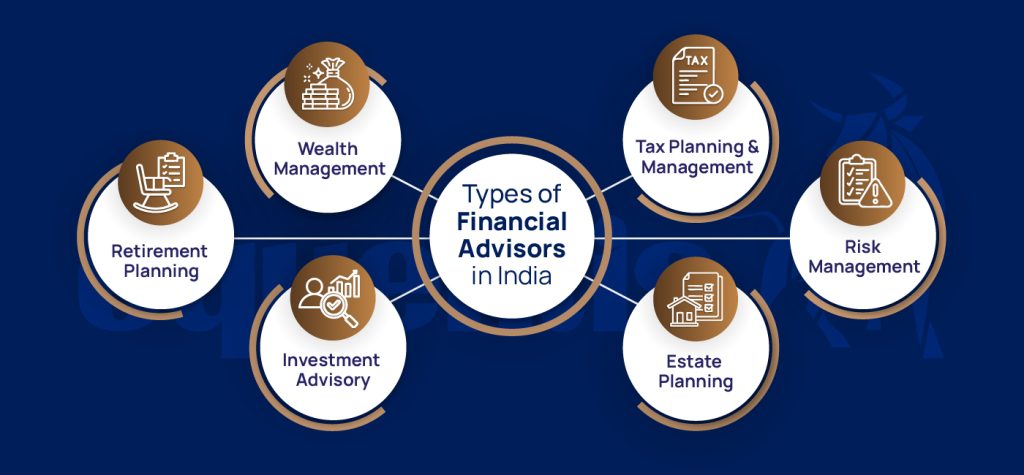Wondering role of financial advisors in India? Financial advisors in India are critical in managing your finances and investments. In today’s fast-paced world, where economic uncertainties are widespread, seeking professional financial advice is becoming increasingly important.
Financial advisory services in India are rapidly growing, and many different services are available. These services range from wealth management and retirement planning to tax planning and estate planning. Knowing which financial advisor is right for you can be challenging with many options.
What is a Financial Advisory?
At their core, financial advisors in India are designed to provide personalized advice and guidance that aligns with an individual’s specific financial goals and needs. Seeking financial advice can also help individuals save time, as financial advisors can handle complicated financial matters and help clients understand market trends.
Who is a Financial Advisor?
A financial advisor in India can help you plan and achieve your financial goals by analyzing your current financial situation, identifying areas of improvement, and suggesting appropriate investment strategies. Financial advisors have the knowledge, expertise, and experience to help individuals make informed investment decisions that can help them achieve their financial objectives.
In this article, let’s understand a complete overview of financial advisory services in India, including the different types of services available and how they work. And also discuss the importance of seeking financial advisory services and how they can help individuals achieve their financial goals.
Types of Financial Advisors in India

With the increasing complexity of financial products and investment options, it can be challenging for individuals and businesses to navigate the market and make informed decisions. This is where financial advisors in India offer expert guidance and customized solutions to help clients achieve their financial goals. But first, let’s understand different types of financial advisory services.
- Wealth Management: Wealth management services provide personalized investment strategies, asset allocation, and risk management advice. They help clients grow and protect their wealth by analyzing their financial situation and creating customized plans aligning with their goals and risk tolerance.
- Investment Advisory: Investment advisory is a financial advisory service that manages investments to achieve specific financial goals. Investment advisors work with clients to develop investment strategies and advise on securities, stocks, bonds, mutual funds, and other investment vehicles. They also monitor and adjust investments to meet the client’s objectives.
- Retirement Planning: Retirement planning is a financial advisory service that helps individuals plan for retirement. Retirement planners work with clients to determine how much money they need for retirement and then develop strategies to help them achieve that goal. This may include setting up retirement accounts, determining the optimal retirement time, and creating a plan to manage retirement income.
- Tax Planning and Management: Tax planning and management is a financial advisory service that helps clients minimize their tax liability. Tax advisors work with clients to identify tax-saving opportunities and develop tax reduction strategies. They may also advise on tax laws, regulations, and filing requirements.
- Estate Planning: Estate planning is a type of financial advisory service that helps individuals plan to transfer their wealth and assets after they pass away. Clients work with estate planners to develop strategies that minimize estate taxes and ensure the distribution of their assets according to their wishes. This may include setting up trusts, creating wills, and establishing charitable giving plans.
- Risk Management: Risk management is a financial advisory service that helps clients manage their financial risks. Risk advisors work with clients to identify potential risks and develop strategies to mitigate those risks. This may include providing advice on insurance, asset allocation, and diversification.
Financial Planning: The Core of Financial Advisory Services
Crafting a financial plan is the core of financial advisory services. A financial plan is a roadmap that outlines the steps needed to achieve financial goals and secure a healthy financial future. Understanding how these services work is essential to make the most of them.
- Initial consultation and assessment: Financial advisors in India typically start with an initial consultation and evaluation, where the advisor meets with the client to understand their financial goals, needs, and concerns. During this phase, the advisor gathers information about the client’s current financial situation, including their income, assets, liabilities, expenses, and investment portfolio.
- Development of a financial plan: The financial advisors in India develop a customized financial plan for the client based on the information gathered during the initial consultation. The plan typically includes recommendations for achieving the client’s financial goals, such as retirement planning, investment management, tax planning, and risk management. Then, the advisor presents the plan to the client, explains the rationale behind the recommendations, and answers any questions the client may have.
- Implementation of the plan: The advisor moves to the implementation phase once the client has approved the financial plan. This involves setting up the necessary investment accounts, insurance policies, and other financial instruments the plan recommends. The advisor may also assist the client with transferring assets or restructuring their portfolio to align with the plan.
- Ongoing monitoring and updates: Financial advisors in India do not end with implementing the financial plan. The advisor continues to monitor the client’s financial situation and the performance of their investments. They may also periodically review the financial plan and make updates or adjustments as necessary to ensure it remains aligned with the client’s goals and changing circumstances.
Why seek Financial Advisory Services in India?
Financial advisory services can provide individuals and businesses with various benefits. Here are some of the key advantages of working with a financial advisor.
- Expertise and knowledge: Financial advisors bring a wealth of expertise and knowledge to the table. Trained and experienced professionals can provide valuable insights into various financial matters, including investments, taxes, and estate planning.
- Personalized advice and guidance: One of the main benefits of financial advisory services is the personalized advice and guidance that clients receive. Advisors work closely with clients to understand their unique financial situations, goals, and concerns. Based on this information, they develop customized financial plans and provide tailored advice.
- Objectivity and unbiased advice: Financial advisors provide objective and impartial advice, which can be especially helpful for clients facing complex financial decisions. Advisors have no vested interest in any particular investment or financial product, and emotional biases or market trends do not sway them.
- Timesaving: Another benefit of financial advisory services is that they can save clients time. Advisors handle many time-consuming tasks associated with managing finances, such as researching investment options, analyzing market trends, and monitoring portfolio performance. This frees up time for clients to focus on other vital areas of their lives.
- Improved investment performance: Financial advisors can help clients improve their investment performance. Advisors have access to a wide range of investment options and can help clients develop a diversified portfolio that aligns with their goals and risk tolerance. They also monitor market trends and adjust investments to maximise returns and minimize risk.
- Stronger Financial Confidence: The most crucial benefit of financial advisory services is the peace of mind that they provide. By working with a financial advisor, clients can feel confident that they are making informed financial decisions and taking steps to secure their financial future.
How to Choose a Financial Advisor?
- Look for an advisor with relevant expertise and qualifications, such as a financial planning certification or a finance degree.
- Research the advisor’s reputation and track record, including reviews from past clients and any disciplinary actions or complaints filed against them.
- Understand the advisor’s fee structure, including any commissions or percentage-based fees they may charge.
- Consider the advisor’s financial advisory services and whether they align with your financial goals and needs.
Key questions to consider when hiring a financial advisor
- How do you typically work with clients? For example, do you provide ongoing support and monitoring or offer one-time consultations?
- What is your investment philosophy? Do you have a particular strategy or approach that you follow?
- What fees or commissions do you charge for your services?
Tips for working effectively with a financial advisor
- Share your financial situation, goals, and concerns openly and transparently.
- Stay engaged and informed about the advice and recommendations your advisor is providing.
- Review and discuss your financial plan with your advisor to ensure it aligns with your goals and objectives.
Final Words
In conclusion, seeking financial advisory services in India can provide numerous benefits, such as better financial planning, risk management, and investment strategies. Moreover, by entrusting your finances to experts, you can make informed decisions and achieve your financial goals. Therefore, understanding the importance of seeking expert guidance to avoid financial pitfalls is essential.
ALSO READ:
WHO ARE SEBI-REGISTERED INVESTMENT ADVISORS?
7 BENEFITS OF CHOOSING A SEBI-REGISTERED INVESTMENT ADVISORY
HOW TO INVEST MONEY LIKE A PRO?
FAQs
Are financial advisory services only for high-net-worth individuals?
No, financial advisory services are available for everyone who wants to manage their finances effectively, regardless of their net worth.
How to choose a reliable financial advisory service provider?
When selecting a financial advisory service, it’s essential to consider factors such as reputation, experience, the ability to customize services to your needs, and past success.
What does a financial advisor do?
A financial advisor provides guidance on managing finances. They offer investment advice, retirement planning, tax planning, estate planning, and insurance recommendations. Advisors set realistic financial goals and create plans to meet them. They also monitor and adjust strategies based on changes in circumstances and market conditions.
Is it worth going to a financial advisor?
Yes, it is worth going to a financial advisor, especially if you need help with complex financial decisions, planning for retirement, managing investments, or minimizing taxes. A financial advisor provides expert guidance tailored to your specific goals and financial situation. Their insights can help you make informed decisions, avoid costly mistakes, and achieve greater financial security, often making their services a valuable investment.
What is the difference between financial advisors and investment advisors?
Financial advisors provide comprehensive financial planning, covering a wide range of services like retirement planning, tax strategies, estate planning, budgeting, and insurance advice.
Investment advisors, on the other hand, specialize primarily in managing investment portfolios and offering investment advice.
While financial advisors take a holistic approach to financial health, investment advisors focus specifically on growing and managing clients’ investments. Both roles may overlap, but their primary functions and expertise areas differ.Are financial advisors safe?
Financial advisors are generally safe to work with, especially if they are certified and reputable. Look for advisors with SEBI registration. Ensuring transparency and understanding their fee structure can also enhance safety.
How useful was this post?
Click on a star to rate it!
Average rating 5 / 5. Vote count: 2
No votes so far! Be the first to rate this post.
I’m Archana R. Chettiar, an experienced content creator with
an affinity for writing on personal finance and other financial content. I
love to write on equity investing, retirement, managing money, and more.
- Archana Chettiar













